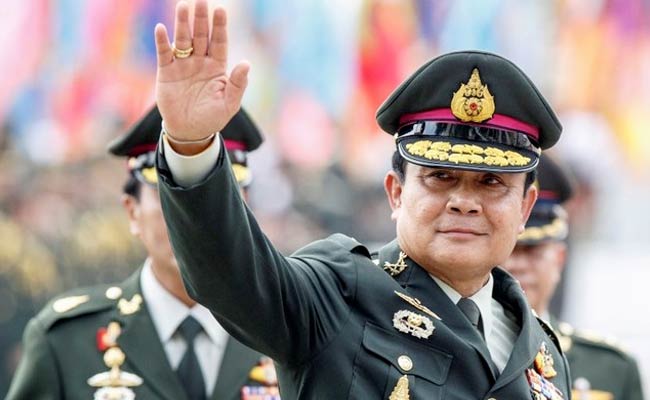BANGKOK — After nearly a decade in power, Prime Minister Prayuth Chan-ocha marches into Sunday’s general election seeking a fresh term as the standard-bearer for an active role for the military in Thailand’s politics.
Prayuth’s quest to soldier on, despite polling third place in successive surveys, has raised the stakes in the May 14 election for Thailand’s 52 million registered voters. One overarching theme is uniquely Thai: The elections are a referendum on the military’s role in the country’s deeply polarized politics.
This stems from the military political dominance following a 2006 coup and another in 2014 — the country’s 13th successful putsch, by the then-army chief Gen. Prayuth, who overthrew a civilian-led government. Over the next nearly two decades Thai politics have been a contest between two feuding camps: royalist-military supporters and their pro-democracy adversaries.
Echoes of the hard-right drumbeat have surfaced in the campaign’s final stretch. Prayuth, the prime ministerial candidate for United Thai Nation, a newly formed party, is banking on his pedigree as a soldier to extend his term. He is being aided by the over 300,000 military, the country’s most formidable political institution.
Voters have been bombarded with election-eve messages touting Thailand’s royalist-military ideology. The UTN’s eleventh-hour online campaign blitz portrays Prayuth as the guardian of the monarchy and Thailand’s political stability. The alternative, warns one grim video, is a country devoid of religion, where girls are lured into pornography and children attack their mothers.
For its part, the military’s publicity machine has broadcast ultrapatriotic songs played during Thailand’s anti-communist conflict during the Cold War and posted a video of Thailand vulnerable to an attack from foreign forces, all to justify the army’s existence. But ultimately it is the voters who will determine if they want a short-tempered 69-year-old ex-general to continue to govern them or opt for a civilian-led alternative.
Still, Prayuth’s two terms — five years as the leader of a junta and then as head of a pro-military government following the 2019 elections — have sought to solidify the grip of the royalist-military establishment over Thai politics.
Changes include the 2017 constitution, a blueprint for constraining, if not eliminating the possibility of civilian rule. The parliament includes an unelected 250-member Senate packed with military loyalists. These lawmakers will have the final say in choosing the new prime minister. Politics under Prayuth has also been marked by the stacking of formally independent institutions such as the election commission, the anti-corruption commission and the Constitutional Court with his allies.
The military has deployed the Internal Security Operations Command (ISOC), a group aimed at fighting communism that dates back to the Cold War, to drive home a pro-royalist-military message.
“ISOC has set up training centres to indoctrinate people in 73,000 villages across the country,” said Puangthong Pawakapan, a Thai political scientist and author of “Infiltrating Society: The Thai Military’s Internal Security Affairs.”
“They point out flaws in Western-style democracy — it focuses only on individual interests and not on national interests or Thai interests, like royalty or being good people,” Puangthong said.
Thai Army chief Gen. Prayuth Chan-ocha, now prime minister, speaks at a meeting in June 2014, after the junta seized power in Thailand the previous month. © Reuters
Sensing an opportunity, the pro-democracy opposition has taken up this military challenge in its campaign. The progressive Move Forward Party, a magnet for the youth vote, has led the charge. On the campaign trail, it has called for sweeping military reform, including ending conscription, which has unnerved a military hierarchy that is not answerable to civilian authority.
Pheu Thai, the largest opposition party, also has the military in its sights. After all, Pheu Thai belongs to a clutch of populist-centrist parties formed by former Prime Minister Thaksin Shinawatra that have won successive national elections since 2001.
Given the stakes, with opinion polls presaging an anti-establishment and anti-incumbent backlash, Prayuth’s response to Sunday’s electoral verdict is expected to shape the post-poll narrative. Already, political insiders in Bangkok are discussing three questions: Will Prayuth accept defeat and step down gracefully, paving the way for a civilian-led government to succeed him? Will he resist by seeking to form a minority government to buy time? Will he secure the backing of influential allies in the Thai royalist-military establishment to prolong his stay as a caretaker prime minister?
Post-election wheeling and dealing is likely to produce new alliances. “This is where money is spent to buy people to build your numbers,” according to one Bangkok-based former parliamentarian. “It is the time to manufacture a win.”
The uncertainty that overshadows Sunday’s vote has given rise to the spectre of another military coup to secure an outcome favourable to the royalist-military establishment. But multiple military sources have ruled out another putsch in the short term.
Part of this pause in coup-making arises from the redeployment of front-line troops, such as two infantry regiments and a cavalry battalion that were previously used to stage coups. The reshuffle is part of a new command structure for military units in Bangkok unveiled at the beginning of the reign of the new monarch, King Maha Vajiralongkorn.
“The necessary conditions are also still not there, such as social unrest and political clashes on the streets,” a senior general told Nikkei Asia. “Coups take time to plan. They do not happen suddenly.”





